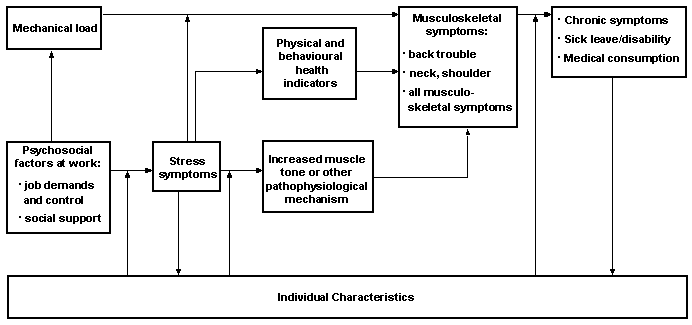 |
| MODULE 7: PSYCHOSOCIAL ISSUES AND OTHER MISCELLANEOUS TOPICS IN OCCUPATIONAL AND ENVIRONMENTAL HEALTH - SECTION 5: WORK AND STRESS: 2: Health Effects Of Stress |
 |
| MODULE 7: PSYCHOSOCIAL ISSUES AND OTHER MISCELLANEOUS TOPICS IN OCCUPATIONAL AND ENVIRONMENTAL HEALTH - SECTION 5: WORK AND STRESS: 2: Health Effects Of Stress |
 DISCUSSION AND QUESTIONS: Based on your reading of the reference material, what do you think are the health effects of stress, particularly work related stress?
DISCUSSION AND QUESTIONS: Based on your reading of the reference material, what do you think are the health effects of stress, particularly work related stress?
The health effects due to stress result from an overworking of normal physiological reactions in the body. A "stressful" situation triggers off central and peripheral nervous system and subsequent endocrine reactions, to prepare the body for the "abnormal situation". This response is sometimes referred to as the "fight or flight" response. Primarily the physiological reactions are a increased heart rate, deeper respiration and tensing of the muscles. The response is similar in all people.
Short-lived or infrequent episodes of stress pose little risk. However, when stressful situations continue unresolved over a long period of time, the body is kept in a constant state of activation, which increases the rate of wear and tear to the body. Ultimately, fatigue and damage occur when the body’s immune system becomes seriously compromised. As a result, the risk of injury and disease increases many-fold.
A variety of health problems are associated with stress, and in some instances, may be the first sign that an individual is stressed. These include gastric problems, headaches, mood and sleep disturbances, depression and deteriorating interpersonal relationships. At the same time, the worker becomes more vulnerable to infectious diseases. The mechanisms that an individual may use to address his stressful situation may, in themselves, result in greater ill health, eg. use of alcohol, psychotropic medication or even illicit drugs. This can eventually also lead to other negative consequences such as increased absenteeism and decreased efficiency.
A considerable amount of research has been conducted into the stressful conditions which result in musculoskeletal disorders. For example, Bongers et al (1993) postulated that the following factors played a role in such disorders:
Psychosocial factors at work directly influence mechanical load as for example in time pressure situations. Demands, job control and social support, together with individual capacity to cope may influence work related stress. Such stress may:
These researchers attempted to explain the interaction between the various factors resulting in a poor health outcome (in this instance, musculoskeletal disease) (Figure 2):
Previous research have indicated the following diseases to be associated with stress:

|
| Figure 2. From Bongers et al: Psychosocial factors at work and musculoskeletal disease. Possible associations of psychosocial factors at work with stress and musculoskeletal symptoms. |